Future Trends in Tourism and Hospitality: A 2030 Perspective Report
VerifiedAdded on 2023/06/09
|11
|2707
|259
Report
AI Summary
This report provides an in-depth analysis of the tourism and hospitality industry's future, focusing on trends expected by 2030. The introduction sets the stage by highlighting the constant evolution of the industry and the impact of global megatrends. The discussion section explores six key factors: healthier food options, the impact of global warming on destinations, the rapid growth of eco-tourism, the integration of robots, the technology boom, and the impact of government regulations. It examines the shift towards healthier diets and the industry's response, the destruction of natural tourist destinations due to climate change, and the rise of eco-tourism. The report also discusses the increasing role of robots and technology in the hospitality sector and the implications of government regulations on local economies. The conclusion emphasizes the continuous growth of the tourism and hospitality sector and highlights the importance of adapting to these trends to ensure sustainability and success. This report provides valuable insights for professionals and students interested in the future of the tourism industry.
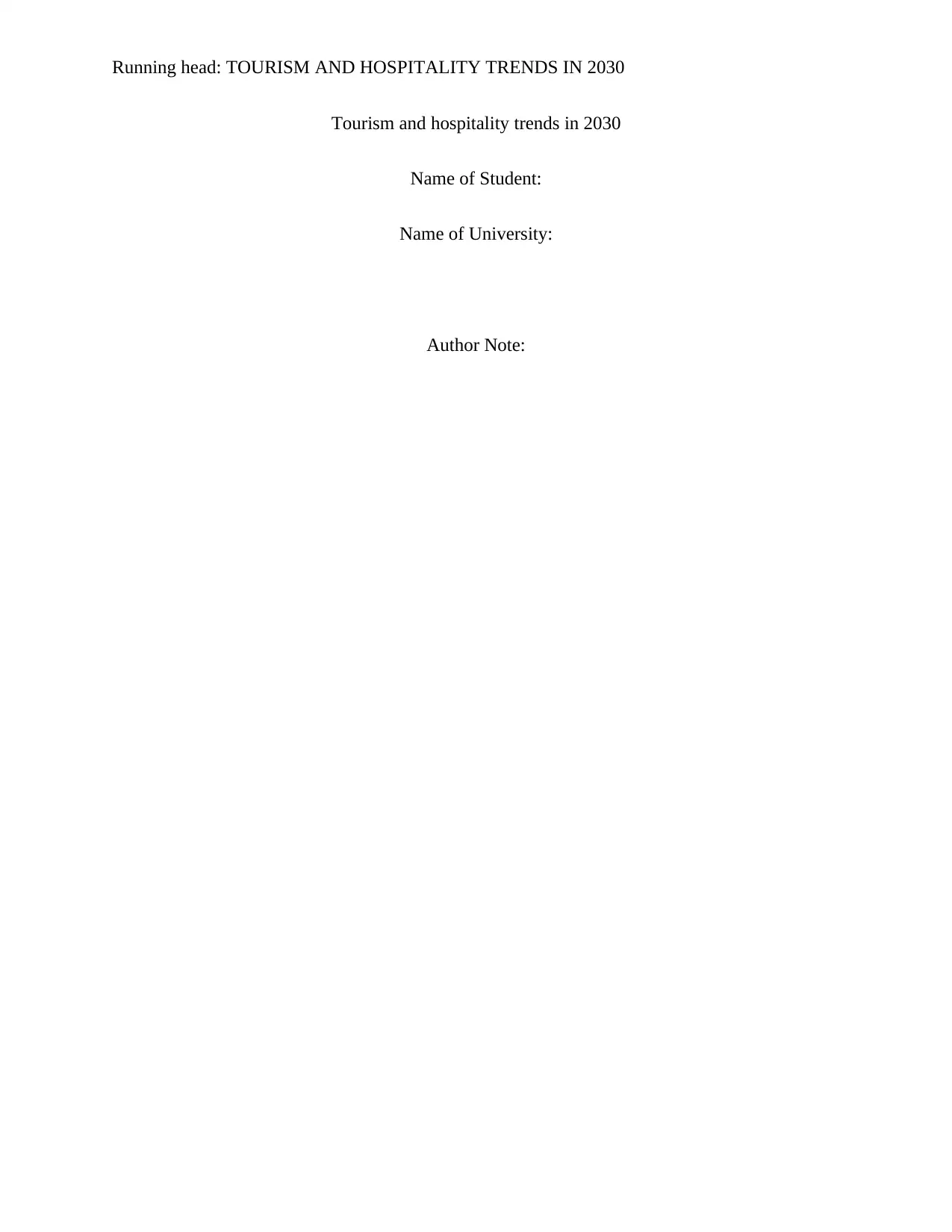
Running head: TOURISM AND HOSPITALITY TRENDS IN 2030
Tourism and hospitality trends in 2030
Name of Student:
Name of University:
Author Note:
Tourism and hospitality trends in 2030
Name of Student:
Name of University:
Author Note:
Paraphrase This Document
Need a fresh take? Get an instant paraphrase of this document with our AI Paraphraser
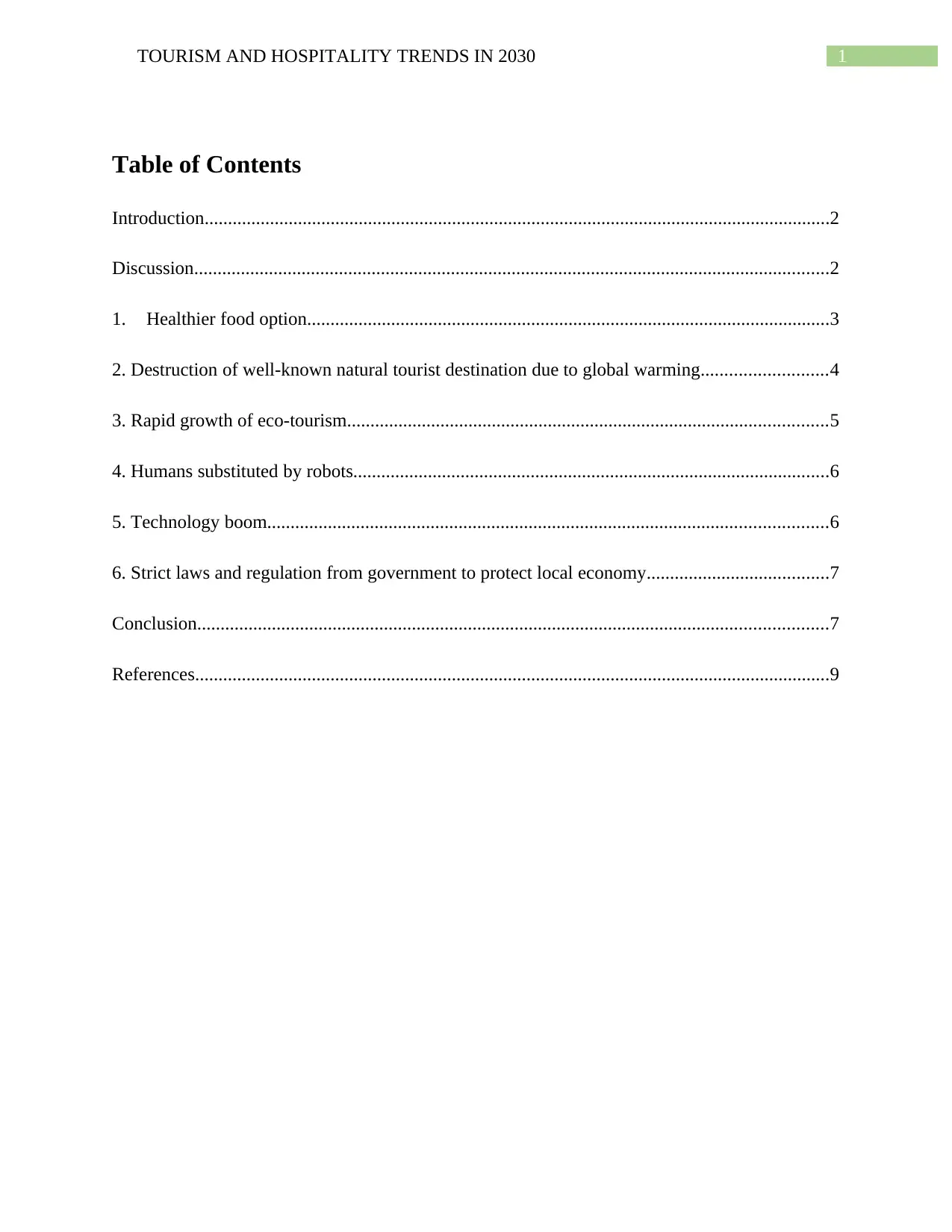
1TOURISM AND HOSPITALITY TRENDS IN 2030
Table of Contents
Introduction......................................................................................................................................2
Discussion........................................................................................................................................2
1. Healthier food option................................................................................................................3
2. Destruction of well-known natural tourist destination due to global warming...........................4
3. Rapid growth of eco-tourism.......................................................................................................5
4. Humans substituted by robots......................................................................................................6
5. Technology boom........................................................................................................................6
6. Strict laws and regulation from government to protect local economy.......................................7
Conclusion.......................................................................................................................................7
References........................................................................................................................................9
Table of Contents
Introduction......................................................................................................................................2
Discussion........................................................................................................................................2
1. Healthier food option................................................................................................................3
2. Destruction of well-known natural tourist destination due to global warming...........................4
3. Rapid growth of eco-tourism.......................................................................................................5
4. Humans substituted by robots......................................................................................................6
5. Technology boom........................................................................................................................6
6. Strict laws and regulation from government to protect local economy.......................................7
Conclusion.......................................................................................................................................7
References........................................................................................................................................9
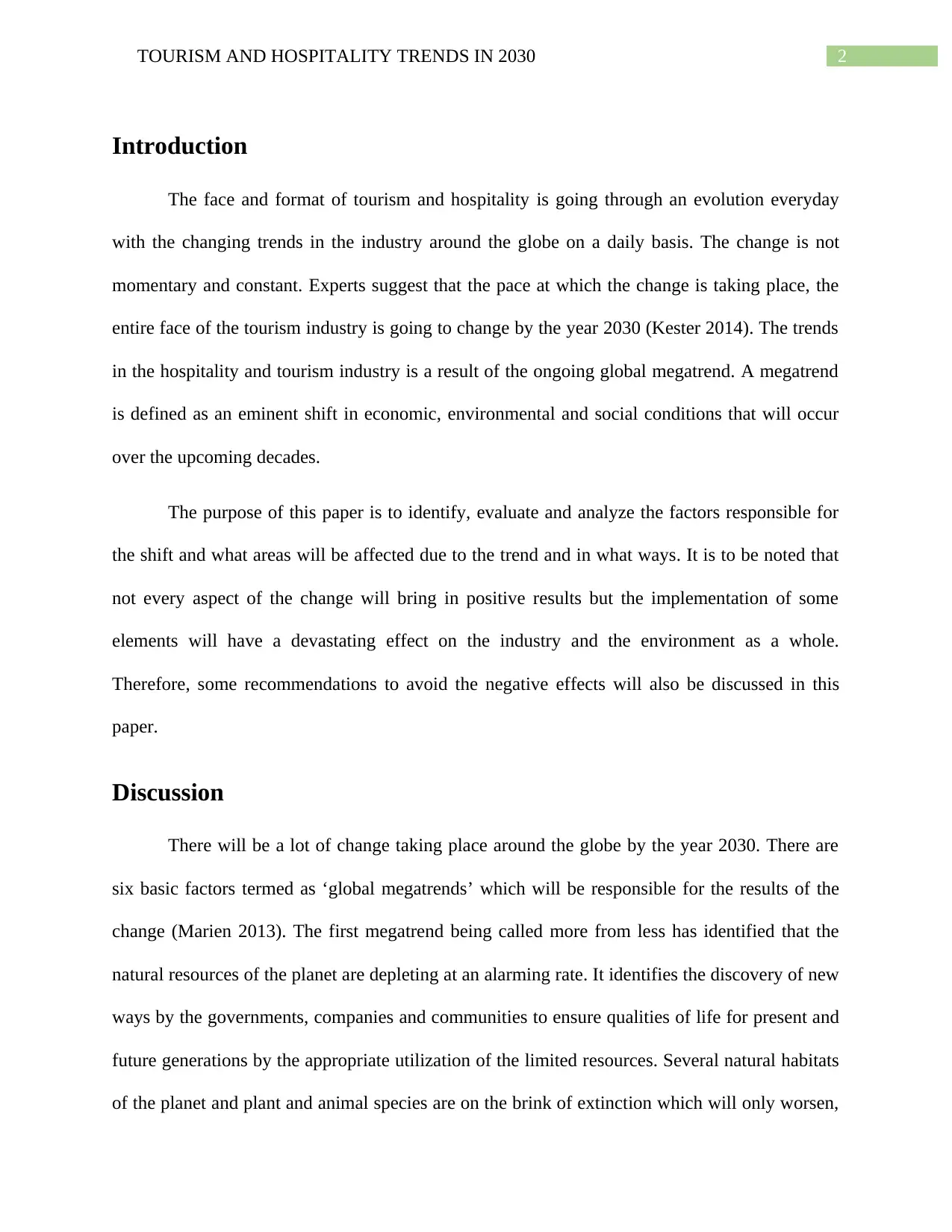
2TOURISM AND HOSPITALITY TRENDS IN 2030
Introduction
The face and format of tourism and hospitality is going through an evolution everyday
with the changing trends in the industry around the globe on a daily basis. The change is not
momentary and constant. Experts suggest that the pace at which the change is taking place, the
entire face of the tourism industry is going to change by the year 2030 (Kester 2014). The trends
in the hospitality and tourism industry is a result of the ongoing global megatrend. A megatrend
is defined as an eminent shift in economic, environmental and social conditions that will occur
over the upcoming decades.
The purpose of this paper is to identify, evaluate and analyze the factors responsible for
the shift and what areas will be affected due to the trend and in what ways. It is to be noted that
not every aspect of the change will bring in positive results but the implementation of some
elements will have a devastating effect on the industry and the environment as a whole.
Therefore, some recommendations to avoid the negative effects will also be discussed in this
paper.
Discussion
There will be a lot of change taking place around the globe by the year 2030. There are
six basic factors termed as ‘global megatrends’ which will be responsible for the results of the
change (Marien 2013). The first megatrend being called more from less has identified that the
natural resources of the planet are depleting at an alarming rate. It identifies the discovery of new
ways by the governments, companies and communities to ensure qualities of life for present and
future generations by the appropriate utilization of the limited resources. Several natural habitats
of the planet and plant and animal species are on the brink of extinction which will only worsen,
Introduction
The face and format of tourism and hospitality is going through an evolution everyday
with the changing trends in the industry around the globe on a daily basis. The change is not
momentary and constant. Experts suggest that the pace at which the change is taking place, the
entire face of the tourism industry is going to change by the year 2030 (Kester 2014). The trends
in the hospitality and tourism industry is a result of the ongoing global megatrend. A megatrend
is defined as an eminent shift in economic, environmental and social conditions that will occur
over the upcoming decades.
The purpose of this paper is to identify, evaluate and analyze the factors responsible for
the shift and what areas will be affected due to the trend and in what ways. It is to be noted that
not every aspect of the change will bring in positive results but the implementation of some
elements will have a devastating effect on the industry and the environment as a whole.
Therefore, some recommendations to avoid the negative effects will also be discussed in this
paper.
Discussion
There will be a lot of change taking place around the globe by the year 2030. There are
six basic factors termed as ‘global megatrends’ which will be responsible for the results of the
change (Marien 2013). The first megatrend being called more from less has identified that the
natural resources of the planet are depleting at an alarming rate. It identifies the discovery of new
ways by the governments, companies and communities to ensure qualities of life for present and
future generations by the appropriate utilization of the limited resources. Several natural habitats
of the planet and plant and animal species are on the brink of extinction which will only worsen,
⊘ This is a preview!⊘
Do you want full access?
Subscribe today to unlock all pages.

Trusted by 1+ million students worldwide
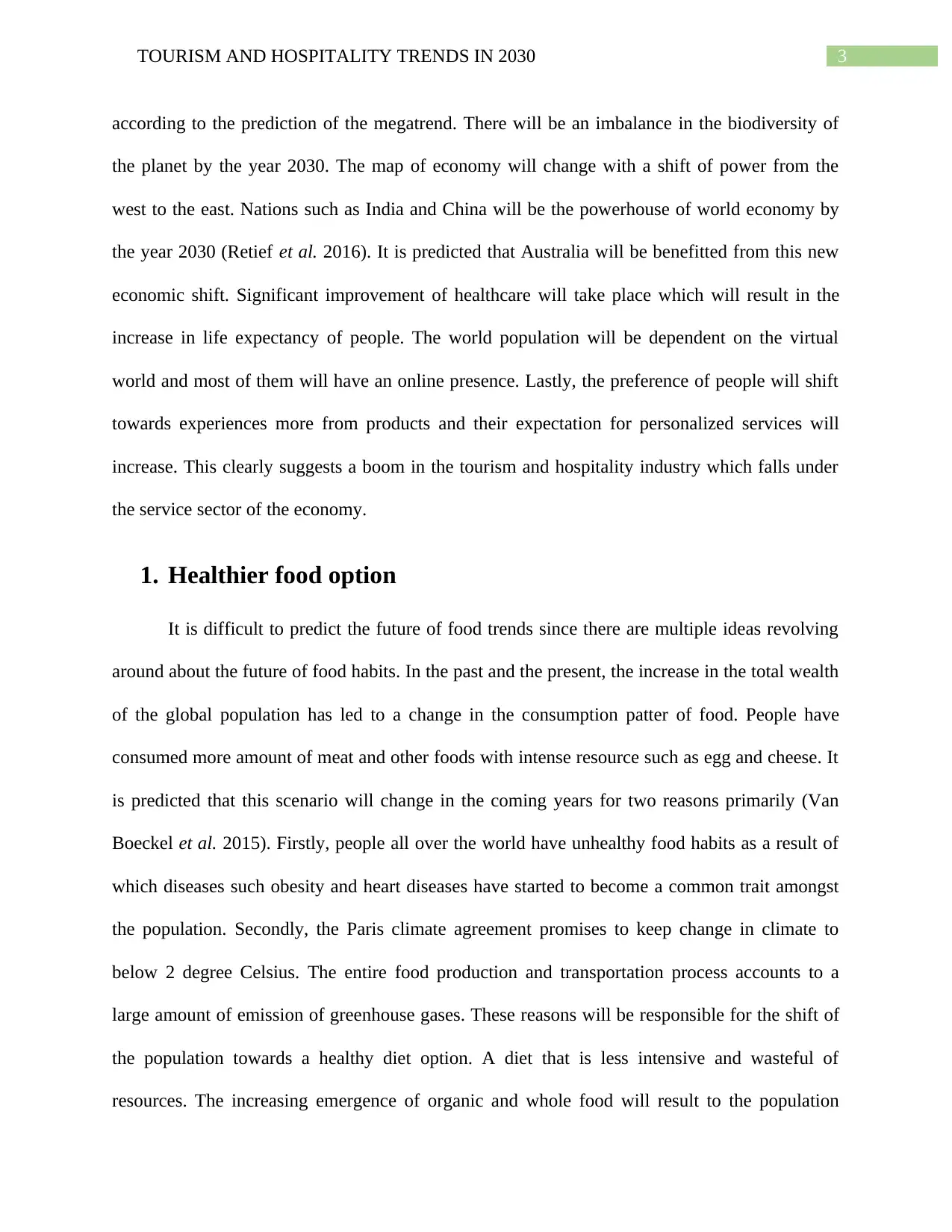
3TOURISM AND HOSPITALITY TRENDS IN 2030
according to the prediction of the megatrend. There will be an imbalance in the biodiversity of
the planet by the year 2030. The map of economy will change with a shift of power from the
west to the east. Nations such as India and China will be the powerhouse of world economy by
the year 2030 (Retief et al. 2016). It is predicted that Australia will be benefitted from this new
economic shift. Significant improvement of healthcare will take place which will result in the
increase in life expectancy of people. The world population will be dependent on the virtual
world and most of them will have an online presence. Lastly, the preference of people will shift
towards experiences more from products and their expectation for personalized services will
increase. This clearly suggests a boom in the tourism and hospitality industry which falls under
the service sector of the economy.
1. Healthier food option
It is difficult to predict the future of food trends since there are multiple ideas revolving
around about the future of food habits. In the past and the present, the increase in the total wealth
of the global population has led to a change in the consumption patter of food. People have
consumed more amount of meat and other foods with intense resource such as egg and cheese. It
is predicted that this scenario will change in the coming years for two reasons primarily (Van
Boeckel et al. 2015). Firstly, people all over the world have unhealthy food habits as a result of
which diseases such obesity and heart diseases have started to become a common trait amongst
the population. Secondly, the Paris climate agreement promises to keep change in climate to
below 2 degree Celsius. The entire food production and transportation process accounts to a
large amount of emission of greenhouse gases. These reasons will be responsible for the shift of
the population towards a healthy diet option. A diet that is less intensive and wasteful of
resources. The increasing emergence of organic and whole food will result to the population
according to the prediction of the megatrend. There will be an imbalance in the biodiversity of
the planet by the year 2030. The map of economy will change with a shift of power from the
west to the east. Nations such as India and China will be the powerhouse of world economy by
the year 2030 (Retief et al. 2016). It is predicted that Australia will be benefitted from this new
economic shift. Significant improvement of healthcare will take place which will result in the
increase in life expectancy of people. The world population will be dependent on the virtual
world and most of them will have an online presence. Lastly, the preference of people will shift
towards experiences more from products and their expectation for personalized services will
increase. This clearly suggests a boom in the tourism and hospitality industry which falls under
the service sector of the economy.
1. Healthier food option
It is difficult to predict the future of food trends since there are multiple ideas revolving
around about the future of food habits. In the past and the present, the increase in the total wealth
of the global population has led to a change in the consumption patter of food. People have
consumed more amount of meat and other foods with intense resource such as egg and cheese. It
is predicted that this scenario will change in the coming years for two reasons primarily (Van
Boeckel et al. 2015). Firstly, people all over the world have unhealthy food habits as a result of
which diseases such obesity and heart diseases have started to become a common trait amongst
the population. Secondly, the Paris climate agreement promises to keep change in climate to
below 2 degree Celsius. The entire food production and transportation process accounts to a
large amount of emission of greenhouse gases. These reasons will be responsible for the shift of
the population towards a healthy diet option. A diet that is less intensive and wasteful of
resources. The increasing emergence of organic and whole food will result to the population
Paraphrase This Document
Need a fresh take? Get an instant paraphrase of this document with our AI Paraphraser
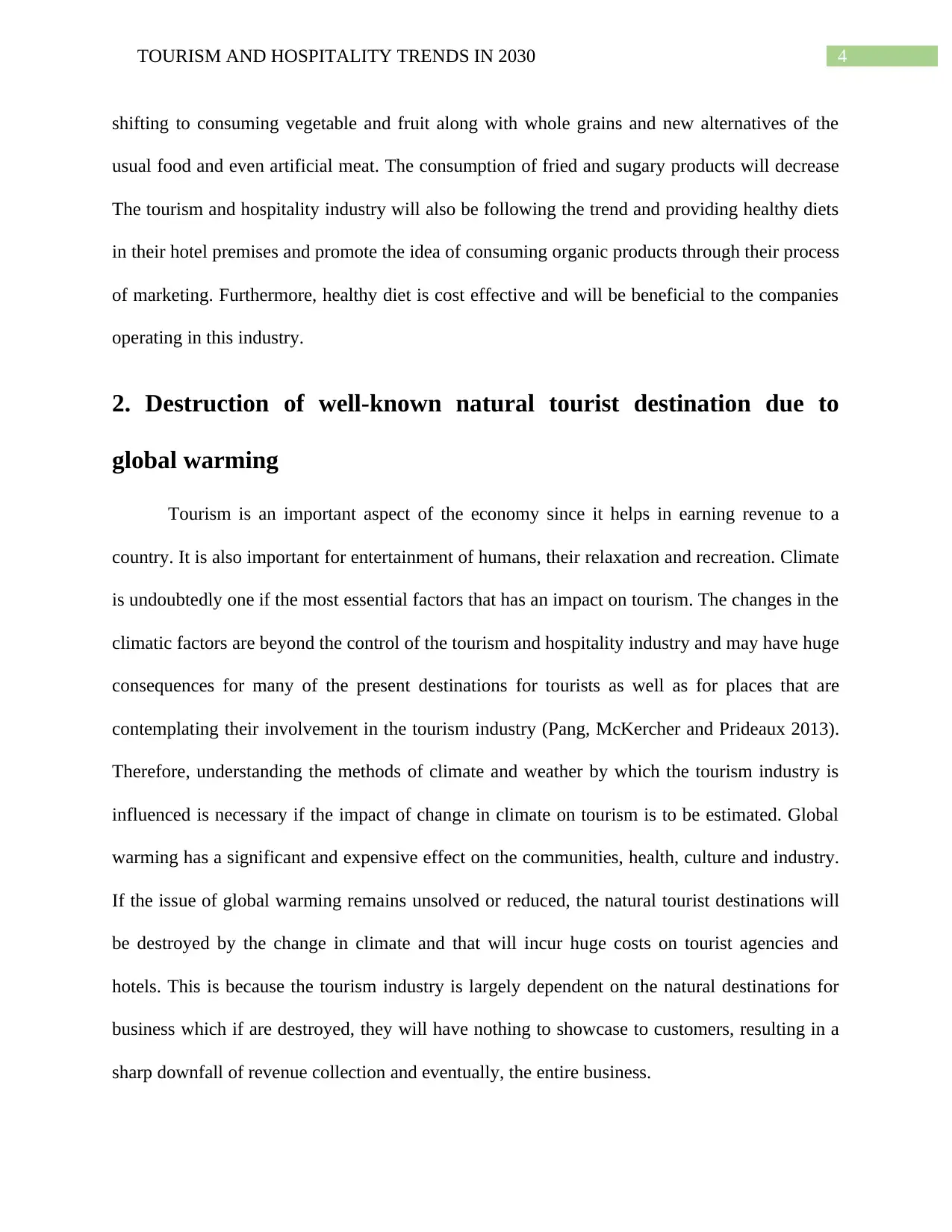
4TOURISM AND HOSPITALITY TRENDS IN 2030
shifting to consuming vegetable and fruit along with whole grains and new alternatives of the
usual food and even artificial meat. The consumption of fried and sugary products will decrease
The tourism and hospitality industry will also be following the trend and providing healthy diets
in their hotel premises and promote the idea of consuming organic products through their process
of marketing. Furthermore, healthy diet is cost effective and will be beneficial to the companies
operating in this industry.
2. Destruction of well-known natural tourist destination due to
global warming
Tourism is an important aspect of the economy since it helps in earning revenue to a
country. It is also important for entertainment of humans, their relaxation and recreation. Climate
is undoubtedly one if the most essential factors that has an impact on tourism. The changes in the
climatic factors are beyond the control of the tourism and hospitality industry and may have huge
consequences for many of the present destinations for tourists as well as for places that are
contemplating their involvement in the tourism industry (Pang, McKercher and Prideaux 2013).
Therefore, understanding the methods of climate and weather by which the tourism industry is
influenced is necessary if the impact of change in climate on tourism is to be estimated. Global
warming has a significant and expensive effect on the communities, health, culture and industry.
If the issue of global warming remains unsolved or reduced, the natural tourist destinations will
be destroyed by the change in climate and that will incur huge costs on tourist agencies and
hotels. This is because the tourism industry is largely dependent on the natural destinations for
business which if are destroyed, they will have nothing to showcase to customers, resulting in a
sharp downfall of revenue collection and eventually, the entire business.
shifting to consuming vegetable and fruit along with whole grains and new alternatives of the
usual food and even artificial meat. The consumption of fried and sugary products will decrease
The tourism and hospitality industry will also be following the trend and providing healthy diets
in their hotel premises and promote the idea of consuming organic products through their process
of marketing. Furthermore, healthy diet is cost effective and will be beneficial to the companies
operating in this industry.
2. Destruction of well-known natural tourist destination due to
global warming
Tourism is an important aspect of the economy since it helps in earning revenue to a
country. It is also important for entertainment of humans, their relaxation and recreation. Climate
is undoubtedly one if the most essential factors that has an impact on tourism. The changes in the
climatic factors are beyond the control of the tourism and hospitality industry and may have huge
consequences for many of the present destinations for tourists as well as for places that are
contemplating their involvement in the tourism industry (Pang, McKercher and Prideaux 2013).
Therefore, understanding the methods of climate and weather by which the tourism industry is
influenced is necessary if the impact of change in climate on tourism is to be estimated. Global
warming has a significant and expensive effect on the communities, health, culture and industry.
If the issue of global warming remains unsolved or reduced, the natural tourist destinations will
be destroyed by the change in climate and that will incur huge costs on tourist agencies and
hotels. This is because the tourism industry is largely dependent on the natural destinations for
business which if are destroyed, they will have nothing to showcase to customers, resulting in a
sharp downfall of revenue collection and eventually, the entire business.
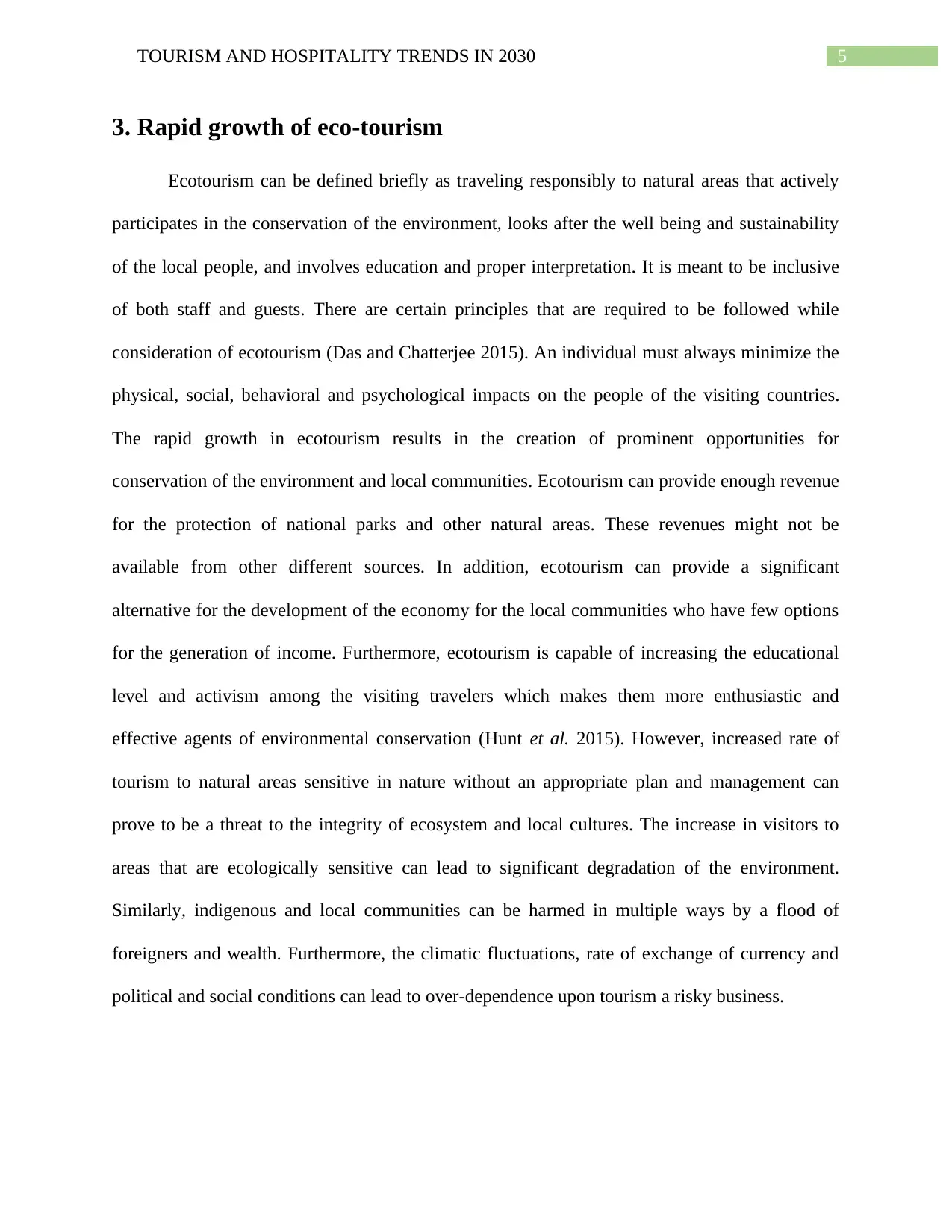
5TOURISM AND HOSPITALITY TRENDS IN 2030
3. Rapid growth of eco-tourism
Ecotourism can be defined briefly as traveling responsibly to natural areas that actively
participates in the conservation of the environment, looks after the well being and sustainability
of the local people, and involves education and proper interpretation. It is meant to be inclusive
of both staff and guests. There are certain principles that are required to be followed while
consideration of ecotourism (Das and Chatterjee 2015). An individual must always minimize the
physical, social, behavioral and psychological impacts on the people of the visiting countries.
The rapid growth in ecotourism results in the creation of prominent opportunities for
conservation of the environment and local communities. Ecotourism can provide enough revenue
for the protection of national parks and other natural areas. These revenues might not be
available from other different sources. In addition, ecotourism can provide a significant
alternative for the development of the economy for the local communities who have few options
for the generation of income. Furthermore, ecotourism is capable of increasing the educational
level and activism among the visiting travelers which makes them more enthusiastic and
effective agents of environmental conservation (Hunt et al. 2015). However, increased rate of
tourism to natural areas sensitive in nature without an appropriate plan and management can
prove to be a threat to the integrity of ecosystem and local cultures. The increase in visitors to
areas that are ecologically sensitive can lead to significant degradation of the environment.
Similarly, indigenous and local communities can be harmed in multiple ways by a flood of
foreigners and wealth. Furthermore, the climatic fluctuations, rate of exchange of currency and
political and social conditions can lead to over-dependence upon tourism a risky business.
3. Rapid growth of eco-tourism
Ecotourism can be defined briefly as traveling responsibly to natural areas that actively
participates in the conservation of the environment, looks after the well being and sustainability
of the local people, and involves education and proper interpretation. It is meant to be inclusive
of both staff and guests. There are certain principles that are required to be followed while
consideration of ecotourism (Das and Chatterjee 2015). An individual must always minimize the
physical, social, behavioral and psychological impacts on the people of the visiting countries.
The rapid growth in ecotourism results in the creation of prominent opportunities for
conservation of the environment and local communities. Ecotourism can provide enough revenue
for the protection of national parks and other natural areas. These revenues might not be
available from other different sources. In addition, ecotourism can provide a significant
alternative for the development of the economy for the local communities who have few options
for the generation of income. Furthermore, ecotourism is capable of increasing the educational
level and activism among the visiting travelers which makes them more enthusiastic and
effective agents of environmental conservation (Hunt et al. 2015). However, increased rate of
tourism to natural areas sensitive in nature without an appropriate plan and management can
prove to be a threat to the integrity of ecosystem and local cultures. The increase in visitors to
areas that are ecologically sensitive can lead to significant degradation of the environment.
Similarly, indigenous and local communities can be harmed in multiple ways by a flood of
foreigners and wealth. Furthermore, the climatic fluctuations, rate of exchange of currency and
political and social conditions can lead to over-dependence upon tourism a risky business.
⊘ This is a preview!⊘
Do you want full access?
Subscribe today to unlock all pages.

Trusted by 1+ million students worldwide
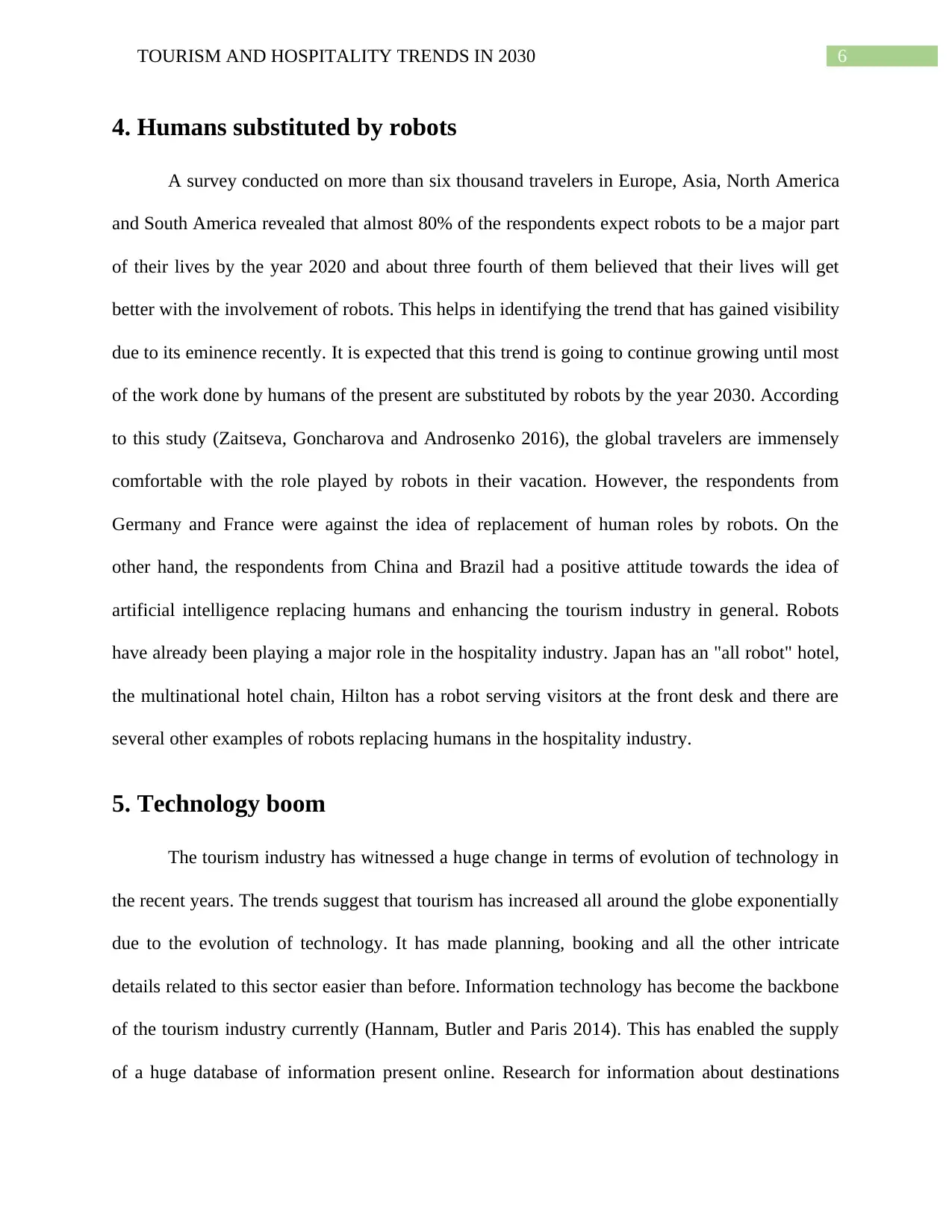
6TOURISM AND HOSPITALITY TRENDS IN 2030
4. Humans substituted by robots
A survey conducted on more than six thousand travelers in Europe, Asia, North America
and South America revealed that almost 80% of the respondents expect robots to be a major part
of their lives by the year 2020 and about three fourth of them believed that their lives will get
better with the involvement of robots. This helps in identifying the trend that has gained visibility
due to its eminence recently. It is expected that this trend is going to continue growing until most
of the work done by humans of the present are substituted by robots by the year 2030. According
to this study (Zaitseva, Goncharova and Androsenko 2016), the global travelers are immensely
comfortable with the role played by robots in their vacation. However, the respondents from
Germany and France were against the idea of replacement of human roles by robots. On the
other hand, the respondents from China and Brazil had a positive attitude towards the idea of
artificial intelligence replacing humans and enhancing the tourism industry in general. Robots
have already been playing a major role in the hospitality industry. Japan has an "all robot" hotel,
the multinational hotel chain, Hilton has a robot serving visitors at the front desk and there are
several other examples of robots replacing humans in the hospitality industry.
5. Technology boom
The tourism industry has witnessed a huge change in terms of evolution of technology in
the recent years. The trends suggest that tourism has increased all around the globe exponentially
due to the evolution of technology. It has made planning, booking and all the other intricate
details related to this sector easier than before. Information technology has become the backbone
of the tourism industry currently (Hannam, Butler and Paris 2014). This has enabled the supply
of a huge database of information present online. Research for information about destinations
4. Humans substituted by robots
A survey conducted on more than six thousand travelers in Europe, Asia, North America
and South America revealed that almost 80% of the respondents expect robots to be a major part
of their lives by the year 2020 and about three fourth of them believed that their lives will get
better with the involvement of robots. This helps in identifying the trend that has gained visibility
due to its eminence recently. It is expected that this trend is going to continue growing until most
of the work done by humans of the present are substituted by robots by the year 2030. According
to this study (Zaitseva, Goncharova and Androsenko 2016), the global travelers are immensely
comfortable with the role played by robots in their vacation. However, the respondents from
Germany and France were against the idea of replacement of human roles by robots. On the
other hand, the respondents from China and Brazil had a positive attitude towards the idea of
artificial intelligence replacing humans and enhancing the tourism industry in general. Robots
have already been playing a major role in the hospitality industry. Japan has an "all robot" hotel,
the multinational hotel chain, Hilton has a robot serving visitors at the front desk and there are
several other examples of robots replacing humans in the hospitality industry.
5. Technology boom
The tourism industry has witnessed a huge change in terms of evolution of technology in
the recent years. The trends suggest that tourism has increased all around the globe exponentially
due to the evolution of technology. It has made planning, booking and all the other intricate
details related to this sector easier than before. Information technology has become the backbone
of the tourism industry currently (Hannam, Butler and Paris 2014). This has enabled the supply
of a huge database of information present online. Research for information about destinations
Paraphrase This Document
Need a fresh take? Get an instant paraphrase of this document with our AI Paraphraser
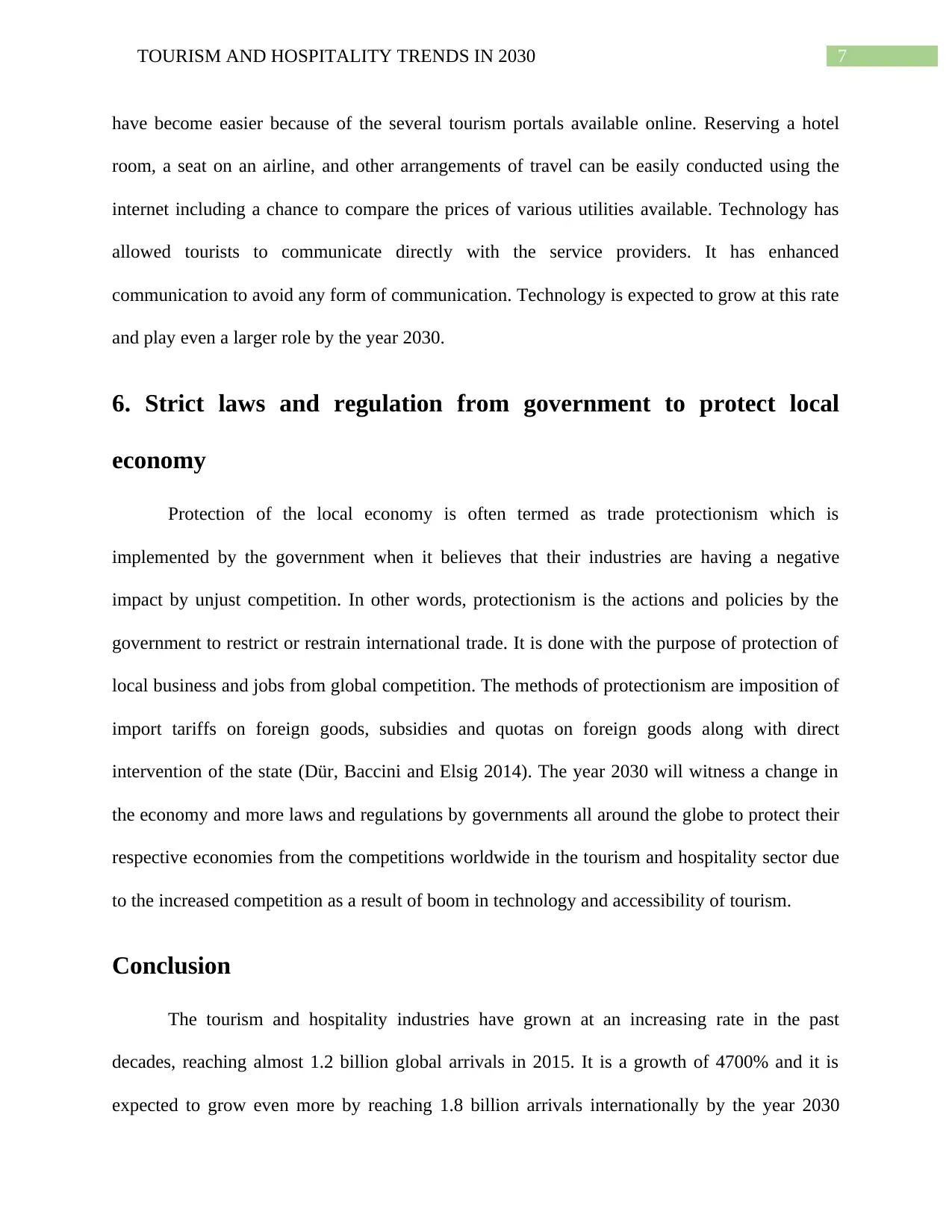
7TOURISM AND HOSPITALITY TRENDS IN 2030
have become easier because of the several tourism portals available online. Reserving a hotel
room, a seat on an airline, and other arrangements of travel can be easily conducted using the
internet including a chance to compare the prices of various utilities available. Technology has
allowed tourists to communicate directly with the service providers. It has enhanced
communication to avoid any form of communication. Technology is expected to grow at this rate
and play even a larger role by the year 2030.
6. Strict laws and regulation from government to protect local
economy
Protection of the local economy is often termed as trade protectionism which is
implemented by the government when it believes that their industries are having a negative
impact by unjust competition. In other words, protectionism is the actions and policies by the
government to restrict or restrain international trade. It is done with the purpose of protection of
local business and jobs from global competition. The methods of protectionism are imposition of
import tariffs on foreign goods, subsidies and quotas on foreign goods along with direct
intervention of the state (Dür, Baccini and Elsig 2014). The year 2030 will witness a change in
the economy and more laws and regulations by governments all around the globe to protect their
respective economies from the competitions worldwide in the tourism and hospitality sector due
to the increased competition as a result of boom in technology and accessibility of tourism.
Conclusion
The tourism and hospitality industries have grown at an increasing rate in the past
decades, reaching almost 1.2 billion global arrivals in 2015. It is a growth of 4700% and it is
expected to grow even more by reaching 1.8 billion arrivals internationally by the year 2030
have become easier because of the several tourism portals available online. Reserving a hotel
room, a seat on an airline, and other arrangements of travel can be easily conducted using the
internet including a chance to compare the prices of various utilities available. Technology has
allowed tourists to communicate directly with the service providers. It has enhanced
communication to avoid any form of communication. Technology is expected to grow at this rate
and play even a larger role by the year 2030.
6. Strict laws and regulation from government to protect local
economy
Protection of the local economy is often termed as trade protectionism which is
implemented by the government when it believes that their industries are having a negative
impact by unjust competition. In other words, protectionism is the actions and policies by the
government to restrict or restrain international trade. It is done with the purpose of protection of
local business and jobs from global competition. The methods of protectionism are imposition of
import tariffs on foreign goods, subsidies and quotas on foreign goods along with direct
intervention of the state (Dür, Baccini and Elsig 2014). The year 2030 will witness a change in
the economy and more laws and regulations by governments all around the globe to protect their
respective economies from the competitions worldwide in the tourism and hospitality sector due
to the increased competition as a result of boom in technology and accessibility of tourism.
Conclusion
The tourism and hospitality industries have grown at an increasing rate in the past
decades, reaching almost 1.2 billion global arrivals in 2015. It is a growth of 4700% and it is
expected to grow even more by reaching 1.8 billion arrivals internationally by the year 2030
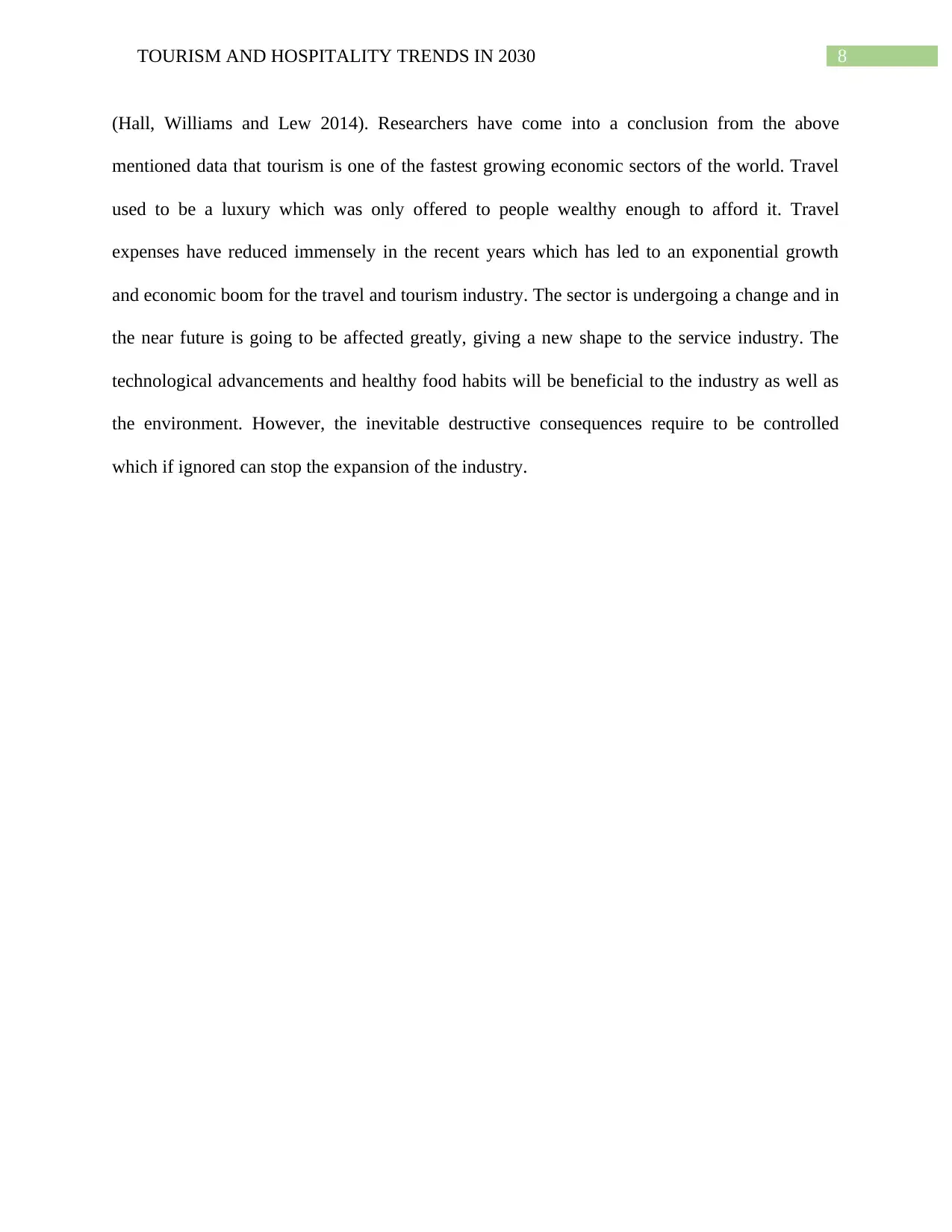
8TOURISM AND HOSPITALITY TRENDS IN 2030
(Hall, Williams and Lew 2014). Researchers have come into a conclusion from the above
mentioned data that tourism is one of the fastest growing economic sectors of the world. Travel
used to be a luxury which was only offered to people wealthy enough to afford it. Travel
expenses have reduced immensely in the recent years which has led to an exponential growth
and economic boom for the travel and tourism industry. The sector is undergoing a change and in
the near future is going to be affected greatly, giving a new shape to the service industry. The
technological advancements and healthy food habits will be beneficial to the industry as well as
the environment. However, the inevitable destructive consequences require to be controlled
which if ignored can stop the expansion of the industry.
(Hall, Williams and Lew 2014). Researchers have come into a conclusion from the above
mentioned data that tourism is one of the fastest growing economic sectors of the world. Travel
used to be a luxury which was only offered to people wealthy enough to afford it. Travel
expenses have reduced immensely in the recent years which has led to an exponential growth
and economic boom for the travel and tourism industry. The sector is undergoing a change and in
the near future is going to be affected greatly, giving a new shape to the service industry. The
technological advancements and healthy food habits will be beneficial to the industry as well as
the environment. However, the inevitable destructive consequences require to be controlled
which if ignored can stop the expansion of the industry.
⊘ This is a preview!⊘
Do you want full access?
Subscribe today to unlock all pages.

Trusted by 1+ million students worldwide
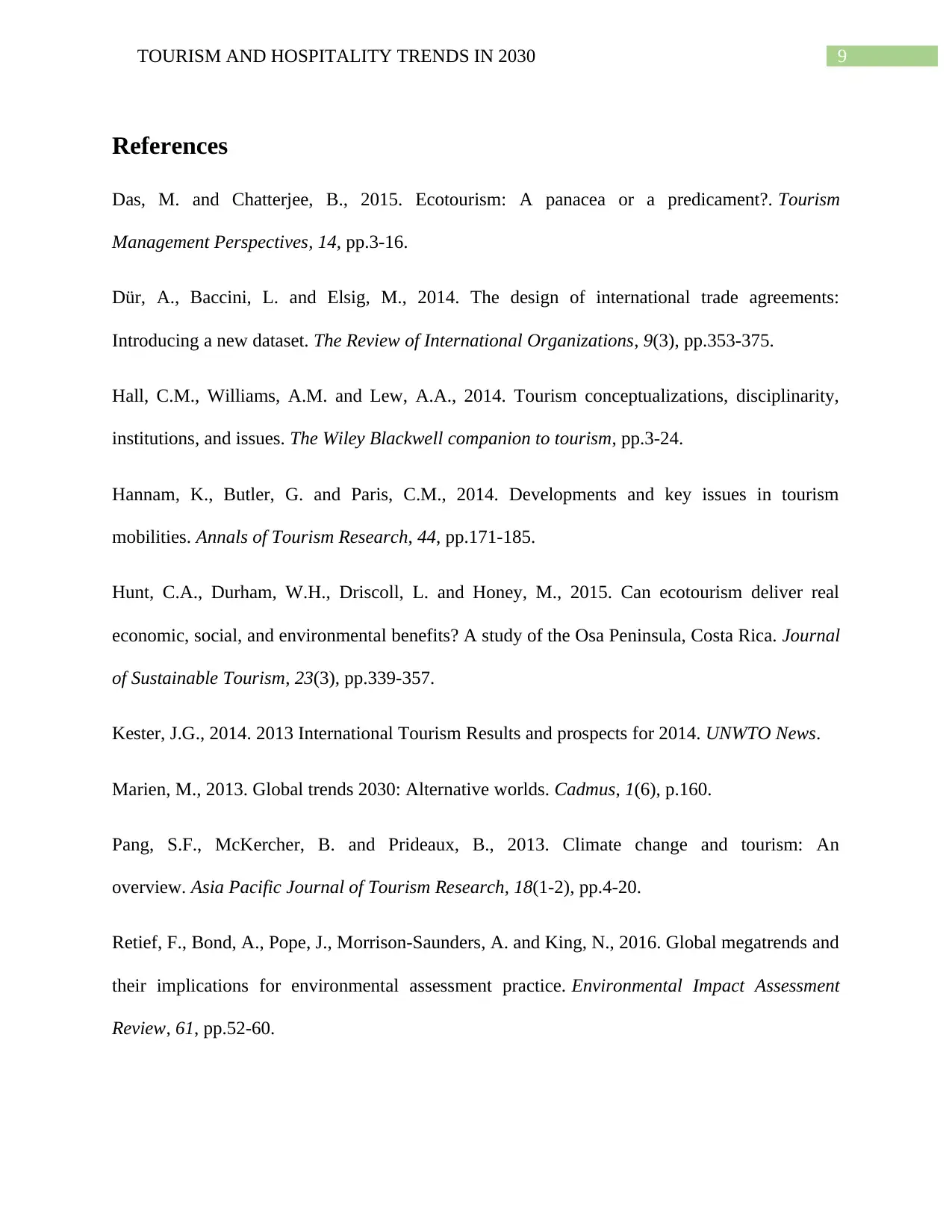
9TOURISM AND HOSPITALITY TRENDS IN 2030
References
Das, M. and Chatterjee, B., 2015. Ecotourism: A panacea or a predicament?. Tourism
Management Perspectives, 14, pp.3-16.
Dür, A., Baccini, L. and Elsig, M., 2014. The design of international trade agreements:
Introducing a new dataset. The Review of International Organizations, 9(3), pp.353-375.
Hall, C.M., Williams, A.M. and Lew, A.A., 2014. Tourism conceptualizations, disciplinarity,
institutions, and issues. The Wiley Blackwell companion to tourism, pp.3-24.
Hannam, K., Butler, G. and Paris, C.M., 2014. Developments and key issues in tourism
mobilities. Annals of Tourism Research, 44, pp.171-185.
Hunt, C.A., Durham, W.H., Driscoll, L. and Honey, M., 2015. Can ecotourism deliver real
economic, social, and environmental benefits? A study of the Osa Peninsula, Costa Rica. Journal
of Sustainable Tourism, 23(3), pp.339-357.
Kester, J.G., 2014. 2013 International Tourism Results and prospects for 2014. UNWTO News.
Marien, M., 2013. Global trends 2030: Alternative worlds. Cadmus, 1(6), p.160.
Pang, S.F., McKercher, B. and Prideaux, B., 2013. Climate change and tourism: An
overview. Asia Pacific Journal of Tourism Research, 18(1-2), pp.4-20.
Retief, F., Bond, A., Pope, J., Morrison-Saunders, A. and King, N., 2016. Global megatrends and
their implications for environmental assessment practice. Environmental Impact Assessment
Review, 61, pp.52-60.
References
Das, M. and Chatterjee, B., 2015. Ecotourism: A panacea or a predicament?. Tourism
Management Perspectives, 14, pp.3-16.
Dür, A., Baccini, L. and Elsig, M., 2014. The design of international trade agreements:
Introducing a new dataset. The Review of International Organizations, 9(3), pp.353-375.
Hall, C.M., Williams, A.M. and Lew, A.A., 2014. Tourism conceptualizations, disciplinarity,
institutions, and issues. The Wiley Blackwell companion to tourism, pp.3-24.
Hannam, K., Butler, G. and Paris, C.M., 2014. Developments and key issues in tourism
mobilities. Annals of Tourism Research, 44, pp.171-185.
Hunt, C.A., Durham, W.H., Driscoll, L. and Honey, M., 2015. Can ecotourism deliver real
economic, social, and environmental benefits? A study of the Osa Peninsula, Costa Rica. Journal
of Sustainable Tourism, 23(3), pp.339-357.
Kester, J.G., 2014. 2013 International Tourism Results and prospects for 2014. UNWTO News.
Marien, M., 2013. Global trends 2030: Alternative worlds. Cadmus, 1(6), p.160.
Pang, S.F., McKercher, B. and Prideaux, B., 2013. Climate change and tourism: An
overview. Asia Pacific Journal of Tourism Research, 18(1-2), pp.4-20.
Retief, F., Bond, A., Pope, J., Morrison-Saunders, A. and King, N., 2016. Global megatrends and
their implications for environmental assessment practice. Environmental Impact Assessment
Review, 61, pp.52-60.
Paraphrase This Document
Need a fresh take? Get an instant paraphrase of this document with our AI Paraphraser
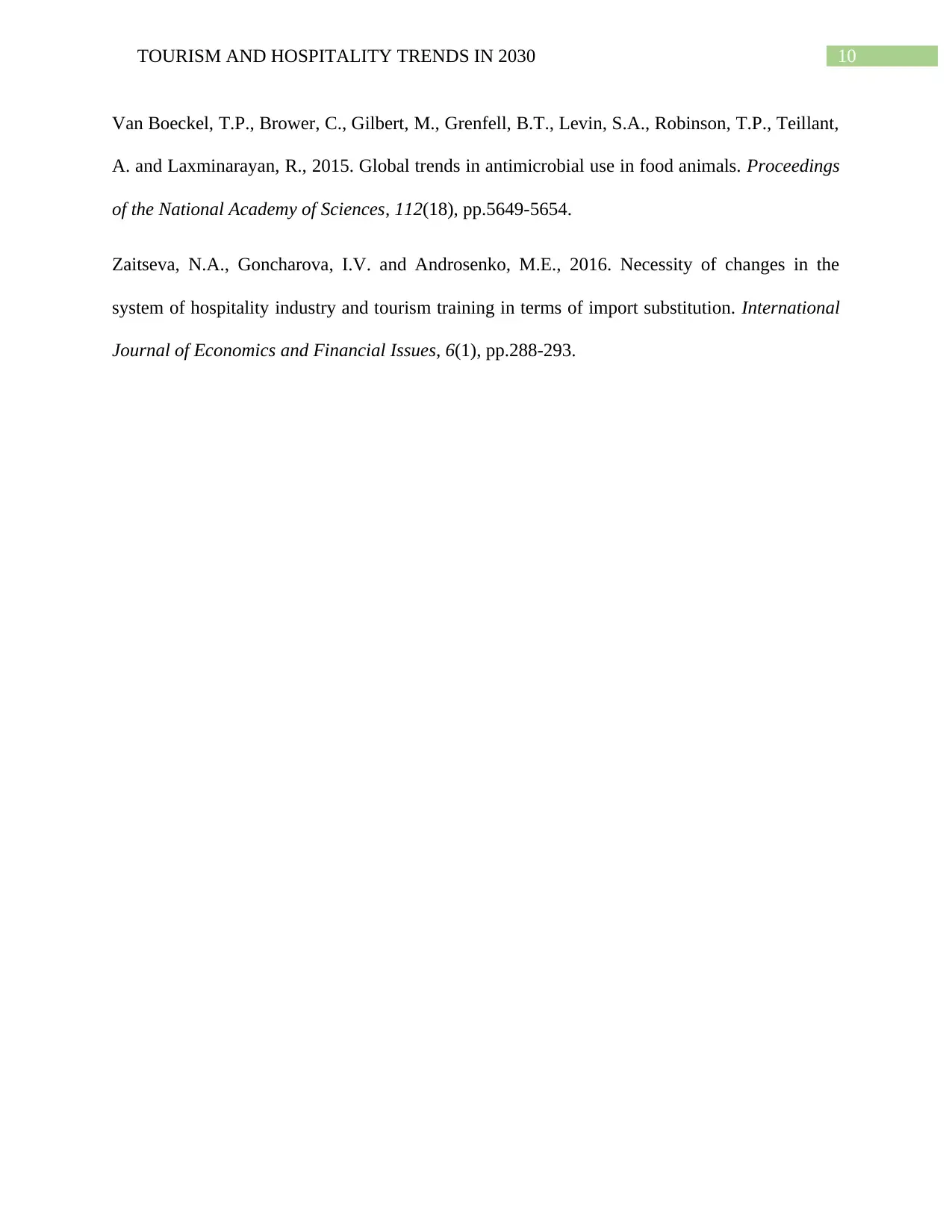
10TOURISM AND HOSPITALITY TRENDS IN 2030
Van Boeckel, T.P., Brower, C., Gilbert, M., Grenfell, B.T., Levin, S.A., Robinson, T.P., Teillant,
A. and Laxminarayan, R., 2015. Global trends in antimicrobial use in food animals. Proceedings
of the National Academy of Sciences, 112(18), pp.5649-5654.
Zaitseva, N.A., Goncharova, I.V. and Androsenko, M.E., 2016. Necessity of changes in the
system of hospitality industry and tourism training in terms of import substitution. International
Journal of Economics and Financial Issues, 6(1), pp.288-293.
Van Boeckel, T.P., Brower, C., Gilbert, M., Grenfell, B.T., Levin, S.A., Robinson, T.P., Teillant,
A. and Laxminarayan, R., 2015. Global trends in antimicrobial use in food animals. Proceedings
of the National Academy of Sciences, 112(18), pp.5649-5654.
Zaitseva, N.A., Goncharova, I.V. and Androsenko, M.E., 2016. Necessity of changes in the
system of hospitality industry and tourism training in terms of import substitution. International
Journal of Economics and Financial Issues, 6(1), pp.288-293.
1 out of 11
Related Documents
Your All-in-One AI-Powered Toolkit for Academic Success.
+13062052269
info@desklib.com
Available 24*7 on WhatsApp / Email
![[object Object]](/_next/static/media/star-bottom.7253800d.svg)
Unlock your academic potential
Copyright © 2020–2026 A2Z Services. All Rights Reserved. Developed and managed by ZUCOL.





